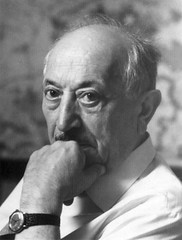Simon Wiesenthal

courtesy Harvard.edu
from the Scotsman:
....the tireless Nazi hunter who tracked down Adolf Eichmann and the policeman who arrested Anne Frank, as well as about 1,100 other war criminals, has died at the age of 96.
Mr Wiesenthal, who himself survived five death camps and lost 89 members of his family in the genocide, dedicated his life not to revenge, but to the pursuit of justice. "When history looks back I want people to know the Nazis weren't able to kill millions of people and get away with it," he once said....
[he] was given armed protection by the Austrian government after an attempt on his life by neo-nazis in 1982...was once asked why he had dedicated his life to pursuing the crimes of the past. He replied: "When we come to the other world and meet the millions of Jews who died in the camps and they ask 'What have you done?' then I will say, 'I did not forget you'."
I'm not a Wiesenthal expert, but to the best of my knowledge he never gave a speech in front of a banner saying "Mission Accomplished."
A man who could have.
..........................................
An addendum, 25 Sep 05: A short while ago I read Howard Davis's post about Wiesenthal. An excerpt:
"Simon Wiesenthal... spent the last 50 years hunting the remaining Nazis all over the world... Honor his memory by donating money to the Simon Wiesenthal Center so they can continue to battle racism, antisemitism, terrorism, and genocide around the world."
I'm not deleting the sentence "a man who could have", above-- however: Howard's post reminds me that sometimes clarification is needed, that when you write in a cyber vacuum you occasionally need such reminders that people can't read your mind. As a general rule I prefer understatement, and strive to use the fewest words possible. Nevertheless in this post, in its previous, sans addendum form, one might well infer that I meant that the type of work Wiesenthal did is no longer needed, that all racism and genocides, and all other assorted forms of man's malevolence to his fellows has been addressed, once and for all. These things are obviously still very much with us. What I meant is that if a man has a calling to do good, as I think all men and women feel called, whether they censor that voice within or not, then when any one person says:
"but what can I do? I'm just one person, and evil is so vast."
Wiesenthal serves as a shining example of one man, who listened to that voice within and answered the call, accomplishing the mission of his life.





<< Home